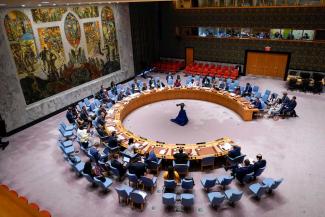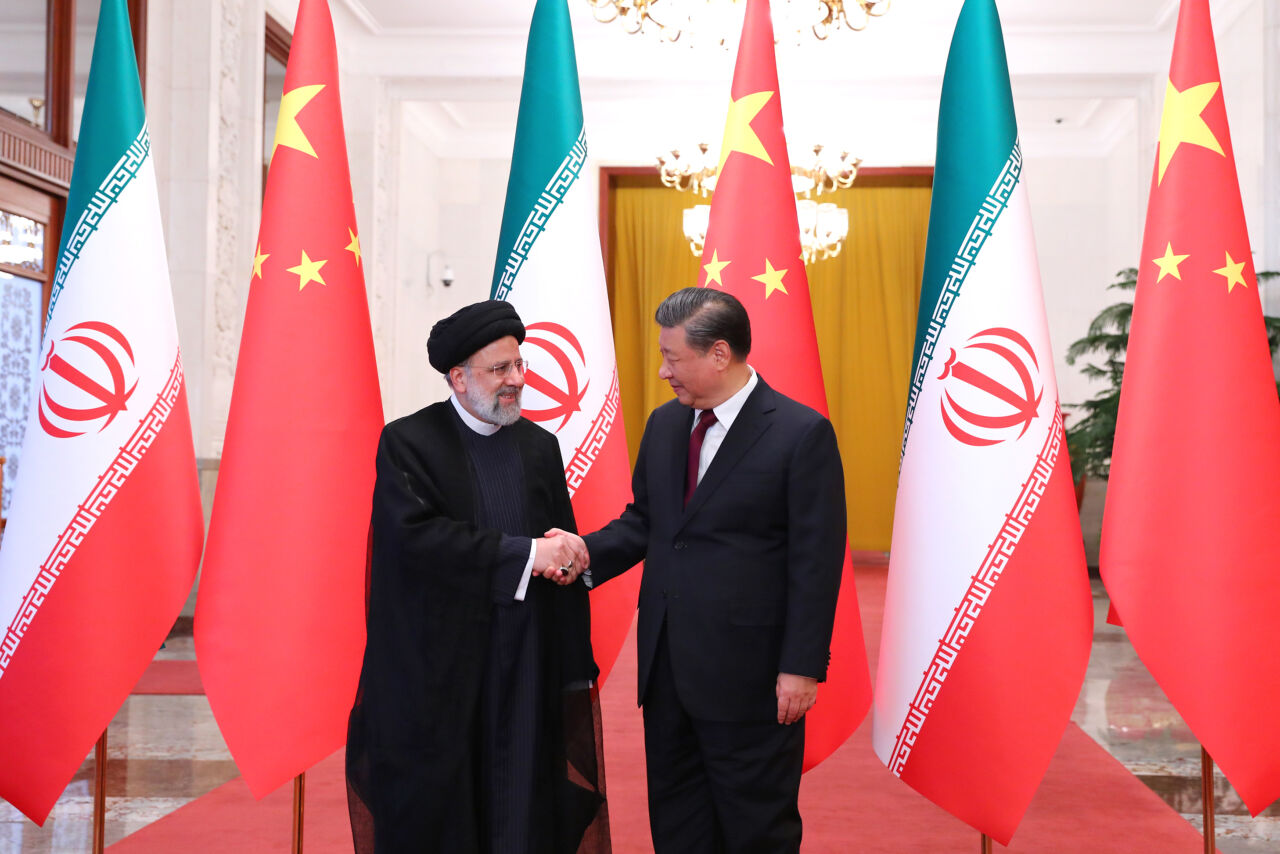Global governance
“Democratic states do not wage war on one another”

Humanity is facing global challenges that nation states on their own cannot rise to. Three examples are the climate crisis, disease control and ensuring a peaceful rule-based order. Has the concept of national sovereignty therefore become obsolete?
No, it has not. Russia’s brutal attack on Ukraine shows that we need a joint understanding of sacrosanct borders. Peace is a precondition for achieving each and every one of the Sustainable Development Goals (SDGs). They spell out a vision of the global common good that was adopted unanimously by all UN members. The two of us discussed their relevance two years ago (see www.dandc.eu).
However, the multilateral order is too weak to guarantee peace. When the aggressor is a permanent member of the UN Security Council (UNSC) and wields veto power, we see multilateral stalemate.
Yes, I think a reform of the UNSC is necessary, but hard to achieve. There probably should be no veto power at all. A good step in that direction is the decision that governments which use the veto right have to explain that step in the UN General Assembly. Moreover, it is important to make sure that the UNSC becomes more regionally representative. Africa and Latin America currently do not have permanent members at all, and the G7 are overrepresented. This imbalance reflects the state of global politics at the end of World War II, when decolonisation was only just beginning in Asia and had not started in Africa. This imbalance thwarts the legitimacy of the UNSC.
Even if the UNSC decided against Russia, sanctions would be hard to impose on a nuclear power.
Well, it would be wise not to try to stop the war by military means, but economic sanctions are evidently feasible. In this wider sense, the war is affecting the whole world. Western economic sanctions are biting, while Russia is using hunger strategically. In this setting, a UNSC decision against Russia would actually be useful in the information war, which is being fought not only, but especially in the digital sphere.
The implication is that sovereignty must go along with obligations today. It is no longer the same concept that helped to end the devastating Thirty Years War in Germany four centuries ago. The idea then was that whoever was the lord of a special area was free to do as he pleased – there was no she among them. Mustn’t global interests override national interests today?
Putting a check on global problems is actually in every nation’s properly understood self-interest. If humanity does not rise to the multitude of global challenges we are facing, every single country will fare worse. Opting out leads to disaster, so we need more cooperation. Only a stronger multilateral system will help us negotiate shared solutions and implement policies in a coherent manner.
Building such a system is obviously very difficult, but we cannot keep postponing action.
Yes indeed, and that is why we see various international alliances or clubs arising. They are supposed to deal with specific problems. At this point, there is no alternative to forming such alliances, but policymakers must pay attention to design them in an inclusive manner and not letting them undermine the existing multilateral system.
So what should policymakers do?
They should keep the alliances open and welcome new partners, including private-sector initiatives, civil-society organisations and subnational institutions. Alliances, moreover, must not define solutions in small circles and then try to impose their decisions on the rest of the world. In this sense, climate-justice partnerships like the one that was formed with South Africa at the Glasgow climate summit last year are quite promising. The partnership is in line with multilateral decision making in the context of the UN Framework Convention on Climate Change (UNFCCC), but much more specific than what global negotiations have spelt out so far.
What are we going to do about reckless politicians and media propagandists who build careers on claiming that global forces are suppressing their nation? Right-wing populist in many countries thrive on pretending they are protecting the people against vicious international powers. They are a threat to democracy, which is why I think we do not show the whole picture when we say that the war in Ukraine is a war waged by despotism on democracy. The conflict is taking place within many countries, including EU members and the USA.
Yes indeed. And that Italy looks more stable than many expected. The situation in Hungary and Poland is difficult, to put it mildly, and recent developments in the Philippines, India and Brazil are worrying. It is important to point out that the conflict between despotism and democracy is not raging only in Ukraine. It is actually a conflict between narrow-minded egotism and the common good, or if you like, between ratio and irratio. Just consider Vladimir Putin’s claim that Ukraine does not really exist because of Russia’s historical roots in Kyiv many centuries ago. By that logic, the city of Rome could lay claim to half of Europe, North Africa and large parts of the Middle East.
What about Putin’s claim that NATO expansion hurt legitimate Russian interests?
Well, that claim only makes sense if one accepts that Russia is entitled to a sphere of influence which it controls and which, not coincidentally, largely coincides with the tsarist empire of the 19th century. NATO expansion was not the result of US imperialism. Because of their historical experiences with Russia, the acceding countries demanded to become members. We should bear in mind, moreover, that history shows that democratic states do not wage war on one another.
But elected governments do sometimes start wars. In 2003, the USA and Britain, for example, led a “coalition of the willing” to invade Iraq and overthrow Saddam Hussein …
This war was a big mistake and indeed illegal, and not only because there was no explicit UNSC mandate. But the war would have probably not happened had Iraq’s leader been accountable to Iraqis. An elected government would most likely have agreed to letting international inspectors look for weapons of mass destruction. It would have had to pay attention to what people think, and they do generally not want to die for a dictator’s military ambitions.
So why do so many governments in low and middle income countries hesitate to take sides against Russia today?
I think their ambivalence is more about not trusting western governments than having faith in Russia. There are many reasons. The western countries are – to a large part – the former colonial powers, and the Soviet Union supported liberation struggles in many places. Western countries’ track record of promising things they later only hesitantly and incompletely deliver may matter even more. Just consider official development assistance, climate finance or vaccine supplies. Western governments tend to emphasise cooperative global governance when it suits them, but act in pursuit of national interests when they can. They also keep stressing human rights, but, when it comes to refugees, all too often disregard those rights. Russia’s regime has a pattern of perpetual and blatant lies, but western governments’ hypocrisy has destroyed trust too. In many people’s eyes, it is equivalent.
But Russia’s disregard for human rights and welfare is glaring.
Indeed, and it is not only evident in terms of Ukrainian suffering. Equally appalling is how the Russian leadership carelessly sacrifices the lives of thousands and thousands of its own young men. That is typical of undemocratic governance. Putin’s nationalism has strong self-destructive tendencies.
What can western governments do to build trust, not least with an eye to forging the global alliances we need to rise to global challenges – and eventually reform the UN system?
First and foremost, they must keep their promises (see Imme Scholz on www.dandc.eu). Just one example: last year’s G7 summit in Cornwall promised to make $ 1 billion available for vaccine provision interantionally, and by January only 30 % had been disbursed. That was in the midst of a global pandemic, as we spelled out in a joint paper prepared by several think tanks recently . If you don’t live up to what you solemnly pledge, you can’t expect others to trust you. This challenge is probably greater than many western policymakers realise. Their counterparts in developing countries know that their peoples are increasingly suffering climate impacts, and that the prosperous nations, which have contributed most to the problem, did not reduce carbon emissions as rigorously as they should have in the 30 years since the UNFCCC was agreed in Rio de Janeiro. Policy coherence is crucial for building trust. Western governments must act convincingly in the global arena, and that includes policy implementation at home. They must accelerate their own transformation towards sustainability.
Link
Kickbusch, I., A.-K. Hornidge, Gitahi, G, and Kamradt-Scott, A., 2022: G7 Measures to enhance global health, equity and security
https://www.think7.org/wp-content/uploads/2022/05/issuepaper_Health_G7-Measures-to-enhance-Global-Health-Equity-and-Security_Kickbusch_Hornidge_Gitahi_Kamradt-Scott.pdf
Anna-Katharina Hornidge is the director of the German Institute of Development and Sustainability (IDOS), which was formerly called German Development Institute. She is also professor for global sustainable development at the University of Bonn.
Twitter: @AnnaK_Hornidge
www.idos-rearch.de















